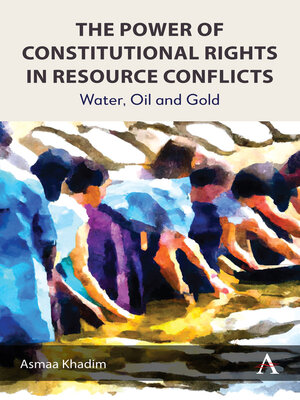The Power of Constitutional Rights in Resource Conflicts
ebook ∣ Water, Oil and Gold · Anthem Environment and Sustainability Initiative
By Asmaa Khadim

Sign up to save your library
With an OverDrive account, you can save your favorite libraries for at-a-glance information about availability. Find out more about OverDrive accounts.
Find this title in Libby, the library reading app by OverDrive.



Search for a digital library with this title
Title found at these libraries:
| Library Name | Distance |
|---|---|
| Loading... |
Water is essential to all life and yet never has anthropogenic activity posed a greater risk to our water resources. This book explores legal mechanisms utilized by communities to protect water resources within the context of protracted mining conflicts, focusing on oil sands development in the Canadian boreal forest and gold mining in ecologically sensitive, glacier-rich areas of Argentina. This book highlights the value of constitutional approaches to environmental rights protection in such conflicts. Despite the incorporation of substantive environmental rights into many domestic constitutions, questions remain about the efficacy and functioning of constitutional methods. The case studies in this book provide insight into how community stakeholders pursue environmental rights claims in jurisdictions that differ in their treatment of environmental rights. These case studies demonstrate how constitutional rights can address inadequate participatory processes and increase accountability and transparency in environmental decision-making, thereby significantly improving access to justice and providing a more equitable means of resolving resource conflicts. By taking a contextual approach, this book makes a valuable contribution to the development of theory relating to environmental constitutionalism and its practical implications for the protection of water resources in contentious mining conflicts.







